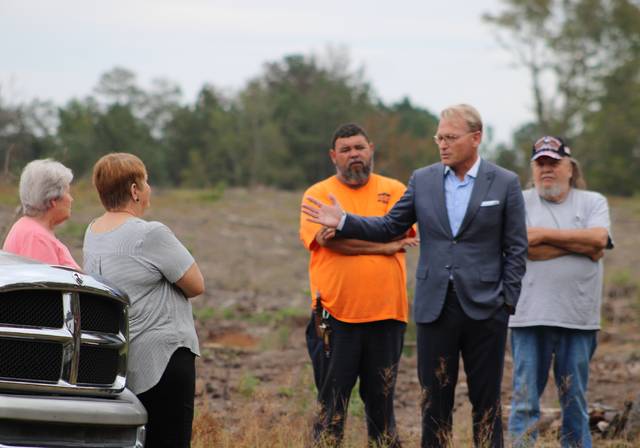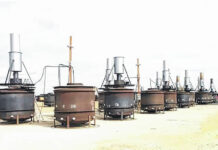
Andrew Basil Polivka, CEO of Polivka International, speaks with neighbors of the site Polivka hopes to build a new industrial facility on about their concerns Wednesday.
Leaders of potential new industry answer questions
HAMLET — The CEO of Polivka International, Andrew Basil Polivka and his son, Basil Jr., on Wednesday met with about a dozen local residents who may be future neighbors of International Tie Disposal LLC, the biochar production company seeking to move onto land on Marks Creek Church Road east of Hamlet by the first quarter of 2021.
During the public hearing process earlier this month for the rezoning of this property to Heavy Industrial, the Richmond County Board of Commissioners were read letters from many of the neighbors, each expressing concern about the impacts to properties their families have lived on for generations or properties that they hoped would at least provide them with a peaceful retirement. The rezoning passed with a split vote following “no” votes from commissioners Jimmy Capps and Don Bryant.
The main concerns the neighbors expressed Wednesday were: chemical runoff into the water supply (Hamlet’s water source is close by), dust in the air, and the noise produced by the industrial facility. Hope Norton, one of the most outspoken of the residents, noted that the people in this area are already dealing with the recent addition of Enviva nearby which doesn’t give them much hope that things will go well if International Tie Disposal is allowed to move there.
“Right now, Enviva is not running. When they’re running their shredder a mile away you can hear it in the middle of the night, you can lay in your bed at night and hear it running,” Norton told Polivka and his son Wednesday as the residents formed a circle around them. “Right now is one of the rare times they’re not running, and if you just listen — this is what we moved here for. You can’t buy that, people are leaving the city to come to this so that’s why for us — yes it’s pollution, it’s just everything. It’s the noise, it’s the runoff, it’s the whole thing because this is a way of life and we don’t want to lose that.”
The younger Polivka, who is serving as director of pyrolysis implementation for this site, said that addressing the dust and sound concerns are “within our budget to deal with, to mitigate.” He said he will be providing data to the neighbors to address these concerns over the coming weeks. On the sound issue, he cautioned that there will never be 100% noise cancellation but the machinery will be inside a building and they will put in a line of trees to create a buffer.
On water, there will be a mat under what could be as many as 500,000 treated rail ties that will be stacked outside which is meant to catch runoff from them. Chad Gardner, whose property is adjacent to the potential site of the new industry, is skeptical this will help.
“It’s hard for me to believe that ‘s going to catch everything that comes out of 500,000 rail ties,” Gardner said in an interview after the meeting. “Are you ever going to change that mat? It’s like a filter right? It’s going to clog up fairly quick with 500,000 rail ties.”
Polivka Jr. said these kinds of meetings are going to be the main way they communicate with the public on the issue.
International Tie Disposal, based in Weddington, North Carolina, submitted an application for a synthetic minor construction permit on Sept. 15 that would authorize the development of a biochar production site at 174 Marks Creek Church Road. The Department of Environmental Quality has yet to make a ruling on this application. Polivka Jr. commended DEQ for being “very thorough” in their review of the company.
The company, which filed articles of organization in Ohio on Nov. 21, 2019, would be the first company of its kind, according to Polikva Jr.. The Hamlet site of International Tie Disposal would receive untreated lumber and creosote-treated railroad ties by rail or truck, shred this down and load it into 426 kilns, 160 of which will be operational on and off every day, according to a permit application obtained by the Daily Journal. Under the conditions of the synthetic minor permit application, the company would limit its emissions of nitrogen oxides, volatile organic compounds, carbon monoxide to less than 100 tons per year and hazardous air pollutants (HAP) to less than the 10 tons per year threshold for individual HAP and 25 tons per year for combined HAP.
International Tie Disposal would hire 55 staff at a salary between $18 and $24 an hour with full health benefits, and will represent a $12 million investment in the county, according to Polivka Jr. He added that they will rely on local contractors as well.
Polivka Jr. said that no one has yet been able to find a viable market for these materials. Currently, biomass power is used to dispose of treated railroad ties, but there have been problems with this that he claims are not associated with their business model which uses pyrolysis, or controlled heating, to volatilize unwanted chemical components to produce carbonaceous biochar.
“There’s biomass, which doesn’t work, and there’s landfills basically. And then there’s this (pyrolysis) which actually has a useful byproduct,” Polivka Jr. said.
Lisa and Chad Gardner, said that while they may have learned more about the company and appreciated the efforts of their leadership to come out and meet with them personally, they don’t feel much better about what this could mean for their area.
“They answered most of the questions but I’m still not feeling any safer,” Lisa said. “I still feel like it’s going to be dangerous for the water and it’s going to be dangerous for the air, and the noise is concerning when we want to live out here in the peace and quiet.”
For Lisa, the only positive thing she learned out of about an hour of conversation was that the grinding wouldn’t be 24 hours a day. Chad said he was relieved that most of the traffic into the site will be rail, rather than trucks, but more questions need to be answered. He’s confident that the Polivkas will be receptive — Polivka Jr. gave Chad his cell phone number.
“If they continue to have meetings and be open about the whole situation we can see where those answers to our concerns fall,” Chad said. “I’m not against industry coming here, I’m against industry coming here that’s going to hurt my health or my quality of life and my neighbors’ quality of life. That’s where I stand.”
Reach Gavin Stone at 910-817-2673 or gstone@www.yourdailyjournal.com. To support the Richmond County Daily Journal, subscribe at https://www.yourdailyjournal.com/subscribe.





